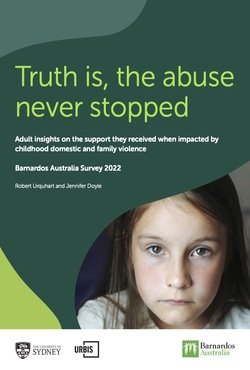By Robert Urquhart and Jennifer Doyle
The devastating effect of domestic and family violence (DFV) on children and young people has been increasingly researched, and its lasting impact acknowledged. Yet, despite the evidence, children and young people continue to be regarded as onlookers who ‘witness’ DFV, rather than as victims who directly experience DFV. Indeed, recognition of children and young people experiencing DFV as victim survivors in their own right and with their own unique needs is long overdue. It is time to recognise children and young people as equal victim survivors with their own safety and support needs, and to establish appropriate DFV support policy and programs which reflect the presence of multiple victims of DFV.
Sydney: Barnardos Australia, 2022. 116p.



